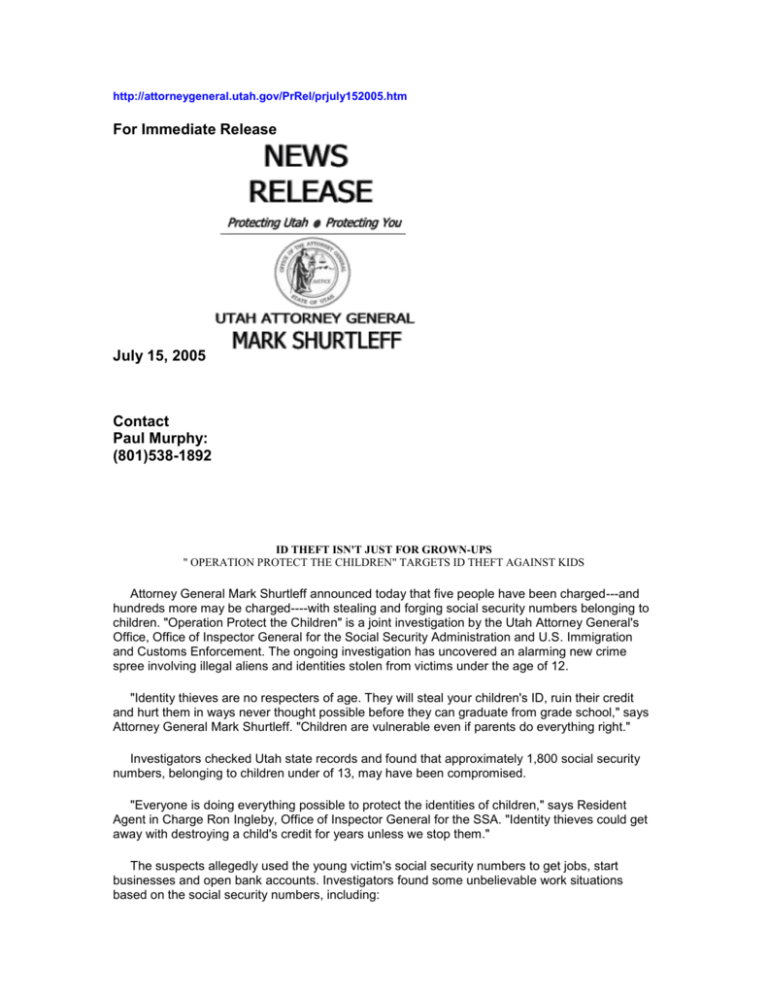
http://attorneygeneral.utah.gov/PrRel/prjuly152005.htm
For Immediate Release
July 15, 2005
Contact
Paul Murphy:
(801)538-1892
ID THEFT ISN'T JUST FOR GROWN-UPS
" OPERATION PROTECT THE CHILDREN" TARGETS ID THEFT AGAINST KIDS
Attorney General Mark Shurtleff announced today that five people have been charged---and
hundreds more may be charged----with stealing and forging social security numbers belonging to
children. "Operation Protect the Children" is a joint investigation by the Utah Attorney General's
Office, Office of Inspector General for the Social Security Administration and U.S. Immigration
and Customs Enforcement. The ongoing investigation has uncovered an alarming new crime
spree involving illegal aliens and identities stolen from victims under the age of 12.
"Identity thieves are no respecters of age. They will steal your children's ID, ruin their credit
and hurt them in ways never thought possible before they can graduate from grade school," says
Attorney General Mark Shurtleff. "Children are vulnerable even if parents do everything right."
Investigators checked Utah state records and found that approximately 1,800 social security
numbers, belonging to children under of 13, may have been compromised.
"Everyone is doing everything possible to protect the identities of children," says Resident
Agent in Charge Ron Ingleby, Office of Inspector General for the SSA. "Identity thieves could get
away with destroying a child's credit for years unless we stop them."
The suspects allegedly used the young victim's social security numbers to get jobs, start
businesses and open bank accounts. Investigators found some unbelievable work situations
based on the social security numbers, including:
A 5-year-old Ogden girl supposedly travels 80 miles to get to her job at a steak restaurant
in Provo.
An 8-year Orem boy apparently owns a cleaning company and works as a prep cook at
two
upscale restaurants in Salt Lake City.
And an 11-year Salt Lake City boy supposedly works for an express air freight company.
Social security numbers were also stolen from a 12-year old boy in Beaver and a 9-year-old
boy in Orem. One suspect told investigators he paid $100 for a boy's social security number. All 5
suspects have been charged with third degree felony counts of identity fraud and forgery.
"It was shocking," says Kim Oakden, the mother of a 12-year-old victim. "My heck! I felt
violated and I'm frustrated that it can happen so easily."
Not only do victims need to fix their credit, they may face problems if they apply for a school
loan, Medicaid, food stamps or other government services.
Scott Smith didn't know his 5-year-old daughter was a victim until he asked about state health
benefits. "It's frustrating," says Smith. "Now I need to do a credit check for my daughter to see
what damage has been done." The suspect allegedly started using the girl's number when she
was only 6 -months-old.
The Utah Attorney General's Office offers these tips to help you and your child from becoming
the next victims:
Do not disclose personal information unless you know how it will be used.
Check credit reports and request a report involving all transactions with you or your
child's name and social security number.
Ask your bank or credit union to require a photo ID and a password for all transactions
from your or your child's account.
Here are some ways employers and lenders can prevent problems:
Ask more questions about a customer before granting credit or hiring an employee.
Check to see that the name, social security number and address are consistent on all
reports and applications.
Employers can check a potential employee's social security number by making a
toll-free call to 800-772-6270.
Make sure third-party service providers and their partners have adequate security to
protect
access to personal data.
This investigation and prosecution for "Operation Protect the Children" is being handled by
Assistant Attorney General Richard Hamp and Lt. Kevin Pepper at the Utah Attorney General's
Office; Ronald Ingleby, Resident Agent in Charge for the Social Security Administration; with
assistance from U.S. Immigration and Customs Enforcement, Utah Department of Workforce
Services and the ID Theft Task Force, comprised of local, state and federal law enforcement
officers and prosecutors.
More information about identity theft can be found at the Attorney General's web site at:
http://www.attorneygeneral.utah.gov/CA/IdFraudMain.htm. Employers can find more information
about checking social security numbers at www.ssa.gov/employer.
Identity thieves think small — children's
personal data Deseret News (Salt Lake City), Jul 16, 2005 by Joseph M.
Dougherty Deseret Morning News
Warnings of identity theft and the steps to take to prevent it have primarily been directed to adults -- the people who
need good credit to buy cars and homes.
But parents should think about getting credit reports for their children, who until now were not readily known to be
targets of identity crimes.
"Most parents are not aware it's happening," said Ron Ingleby of the Office of Inspector General for the Social Security
Administration.
At a news conference Friday, he said he knows of at least three crime rings in the Salt Lake area that are forging the
identity of children to either sell or use themselves.
Arrest warrants have been issued for five people charged with stealing and forging Social Security numbers belonging
to children. The five are expected to be arrested next week, and Attorney General Mark Shurtleff said he expects
hundreds more people to be charged as the operation continues.
One of those warrants is for the person who stole Bailey Smith's Social Security number.
Smith is 5 years old and about to start kindergarten. She barely knows what a Social Security number is.
But Bailey's parents, Scott and Kelly Smith, found out their daughter's identity had been compromised after the Utah
Department of Workforce Services found an Orem restaurant employee with Bailey's Social Security number.
Either someone had stolen her identity or the 5-year-old had been commuting from Ogden to Orem every day without
her parents' knowledge.
"That's good mileage for a trike," Scott Smith said.
Plans are under way to rectify the situation, and the Smiths are relieved that the person using Bailey's number hasn't
done anything more than using it to get a job -- as far as they know.
According to the Utah Attorney General's Office, other victims are an 8-year-old Orem boy who appears to own a
cleaning company and works as a prep cook at two upscale Salt Lake restaurants. An 11- year-old Salt Lake boy
appears to work for an express air freight company, authorities found.
Whoever used Bailey Smith's identity began doing so when she was 6 months old.
"Identity thieves are no respecters of age," said Shurtleff. "Children are vulnerable even if parents do everything right."
The Smiths said they have been avid shredders and kept Bailey's number secret.
Authorities aren't certain how the numbers are obtained. But the numbers are easy to forge. Since those applying for
Social Security numbers from Utah receive either a 528 or 529 number as the first three digits, investigators theorize
that the forgers just make up at random the remaining six numbers, which are then put on a fake Social Security card.
The phony Social Security cards can be sold on the street for between $20 and $100.
The Social Security Administration initiated the current investigation when it alerted state officials about a problem in
Utah with compromised Social Security numbers.
The ensuing investigation by the Identity Theft Task Force's Operation Protect the Children turned up at least 1,800
forged Social Security numbers assigned to Utah children 12 or under. Lt. Kevin Pepper, an investigator with the task
force, said 3,200 victims fell between the ages of 13 and 18 years old.
Ninety percent of the cases involve illegal aliens who use the identities to find work, Ingleby said.
In some cases, a deadbeat parent uses a child's number, Ingleby said.
Employers can help by being more vigilant during the hiring process and verifying an applicant's Social Security
number, Shurtleff said.
Employers can call toll-free 800-772-6270 to check up to five potential employees' numbers with the Social Security
Administration. Information is available at www.ssa.gov.
Contributing: Associated Press
E-mail: jdougherty@desnews.com
Copyright C 2005 Deseret News Publishing Co.
Provided by ProQuest Information and Learning Company. All rights Reserved.
http://www.kslradio.com/index.php?sid=219062&nid=19
Thieves Stealing Identities Of Children
Arrest warrants were issued Friday for five illegal immigrants who fraudulently used the Social
Security numbers assigned to Utah children to get jobs.
(Jul 15, 2005) -KSL NEWSRADIO AUDIO BOX
KSL NewsRadio's Ben Winslow Reports: Download MP3
KSL NewsRadio's Ben Winslow Reports: Streaming
Audio
SALT LAKE CITY (KSL News Services) -- SALT LAKE CITY (AP) -- Arrest warrants were issued Friday for five
illegal immigrants who fraudulently used the Social Security numbers assigned to Utah children to get jobs.
The five were expected to be arrested on identity theft and forgery charges by early next week in an ongoing operation
that could eventually land hundreds of undocumented workers in jail, Utah Assistant Attorney General Rich Hamp
said.
"The numbers are being sold on the streets, you can virtually buy for $20 and get a forged Social Security card that you
present to employers to get employment," he said.
The Social Security Administration initiated the investigation when it came to the state, saying there seemed to be a
problem in Utah with compromised Social Security numbers.
The ensuing investigation turned up at least 1,800 Social Security numbers assigned to Utah children 12 or under, with
90 percent to 95 percent of them being used by someone working.
Realizing that number was too unwieldy, investigators whittled the list down to about 200 names of children
supposedly collecting wages.
"In terms of catching them (illegal immigrants), it was a matter of taking a kid's number, coming back with 5-year-olds
that were making several thousand of dollars a year in a county other than where they live," Hamp said.
"It became kind of easy, the number is what is bothersome," he said.
Identity theft problems also were cropping up, he said, like when parents sent their child's Social Security number into
CHIP, the state-run insurance program for children.
"We've had kids that have gotten letters from the state, saying they can't get CHIPs program benefits because 'You're
30 and working,"' he said.
The numbers are easy to forge. Since those applying for Social Security numbers from Utah receive either a 528 or 529
number as the first three digits, forgers just make up at random the remaining six numbers, which are then put on a
faked Social Security card.
Since this is being done at the street level and in a number of states, Hamp said it's too difficult to go after the sellers,
and it's easier to find the buyers at their new jobs.
Hamp said potential employers could prevent this problem by calling the Social Security Administration on a toll-free
number to see if an applicant's Social Security number is valid. "The problem could be readily solved up front," he said.
The state investigation is a joint operation with the Office of Inspector General for the Social Security Administration
and U.S. Immigration and Customs Enforcement.
(Copyright 2005 KSL NewsRadio 1160 & The Associated Press. All Rights Reserved.)
http://sltrib.com/portlet/article/html/fragments/print_article.jsp?article=2864383
Article Last Updated: 7/16/2005 02:46 AM
ID thieves target Utah's kids
"Operation Protect the Children": The AG has charged five in the new campaign; he
hopes to track down hundreds more
By Sheena McFarland
The Salt Lake Tribune
Salt Lake Tribune
Every day, 5-year-old Bailey Smith travels 80 miles from her Ogden home to work at a steak restaurant in Provo.
Well, at least according to her Social Security records.
Smith is one of about 1,800 Utah children younger than 13 who are victims of identity theft.
Utah Attorney General Mark Shurtleff has charged five people with third-degree felony counts of identity fraud
and forgery, the first charges in what he calls "Operation Protect the Children."
His office is focusing on about 200 of the 1,800 cases of child identity theft. The office whittled down the list to
a "more manageable" number based on how extensively a stolen Social Security number is being used, among
other criteria, according to Rich Hamp, assistant attorney general.
The number of children younger than 18 affected by identity theft is probably close to 4,000 in Utah, Hamp
said.
"Identity thieves are no respecters of age. They will steal your children's identity, ruin their credit and hurt
them in ways never thought possible before they can graduate from grade school," Shurtleff said.
The theft of children's identities can ruin their credit ratings before they are even old enough to obtain credit. It
also can keep them from receiving benefits under programs such as the state-funded Children's Health Insurance
Program because eligibility checks done by the agency show that a child applicant has an income.
Two primary offenders are parents and undocumented immigrants.
"A deadbeat dad will take off and take his child's identity with him," said Ron Ingleby, agent in charge at the
Office of Inspector General for the Social Security Administration.
Some undocumented workers with children who are citizens name children after themselves, then use their
cards, Ingleby said.
Other numbers, such as Bailey Smith's, are purchased by undocumented workers.
Smith's number has been in use since she was 6 months old, and her parents wouldn't have known unless the
attorney general had called.
That's why children's Social Security numbers are so attractive to thieves.
Generally, children don't use their numbers until they apply for car insurance or jobs at age 16, so thieves have
plenty of time to use the numbers without ramifications, Scott Smith said.
To track down numbers in use, the attorney general's office has delved into the records for the Department of
Workforce Services to find children who are reporting income.
The office is notifying parents when it finds a case.
For Bailey Smith's parents, Kelly and Scott, their anger resides not with the undocumented worker who bought
their child's number "to get a leg up," but with the agency that supplied it.
"We've been the ultra-paranoid parents. We shred all of our documents. We never give out Bailey's number
unless it's to a hospital or doctor," Scott Smith said.
Warrants have been issued in the Smiths' case, but no arrests have been made.
Scott Smith hopes he can clear his daughter's record by the time she turns 16. "We probably have a good eight
or 10 years ahead of us to clean up this mess."
How to protect your kids: Some tips
* Do not disclose personal information unless you know how it is used.
* Ask your bank or credit union to require a photo identification and a password for all transactions from your
account, or your child's.
* Check credit reports and request a report involving all transactions with the name and Social Security number
of you or your child. For a free credit report, visit http://www.annualcreditreport.com.
* Visit the AG Web site at http://www.attorneygeneral.utah.gov/CA/IdFraudMain.htm for more information
about identity theft.
Source: Utah Attorney General's Office
http://www.standard.net/standard.php/56359/?printable=story
Kids targeted in ID theft
Saturday, July 16, 2005
By Shane Farver
Standard-Examiner staff
sfarver@standard.net
OGDEN -- Identity theft doesn't discriminate by age.
As many as 1,800 children under 13 in Utah may have had their identities compromised, Utah
Attorney General Mark Shurtleff said Friday. A new joint investigation, called "Operation
Protect the Children," has uncovered a crime wave in which children are being victimized by
identity theft.
Ogden resident Scott Smith, 42, found out his daughter was among the victims when he
received a call from the Utah Attorney General's Office earlier this year.
An agent from the office told Smith his 5-year-old daughter's Social Security number was
being used by a woman to work at a steakhouse in Provo. His daughter's identity could have
been compromised as early as when she was 6 months old, Smith said.
"It just totally threw us," he said.
After the call, Smith went online to get a free credit report for his daughter's Social Security
number, but found that he had to get that information by mail because his daughter, Bailey,
isn't old enough to have a driver license. He has yet to receive a reply in the mail.
"It took me 40 years to get bad credit," he said. "Imagine where I'd be if I started
kindergarten with a rap sheet."
As it turns out, Bailey is among scores of children whose identities may have been stolen in
Utah.
Suspects may use that information from children to gain employment, start businesses and
open bank accounts, a written statement from the Attorney General's Office said.
The statement said five people have been charged with stealing and forging Social Security
numbers belonging to children, and hundreds more may follow.
The suspect in Smith's case is among those who are charged.
"Social Security kind of flagged it (the problem) to my attention," said Richard Hamp,
assistant attorney general.
He partnered with Workforce Services and ran a check on children under age 12 because, he
said, children of that age are usually not employed.
"Sure enough, 1,800 kids popped up that had significant employment histories," Hamp said.
The Attorney General's Office teamed up with the Office of Inspector General for the Social
Security Administration and U.S. Immigration and Customs Enforcement for the investigation.
Smith said his daughter's Social Security number was sold to the suspect.
"You can buy virtually anybody's Social Security number for $20 (on the black market)," Hamp
said.
He said the Attorney General's Office plans to pursue sellers during the operation.
Another identity theft crime was reported in Ogden last week.
Police received a report from a Division of Child and Family Services agent that said a 9-yearold boy and 3-year-old girl had their identities stolen, Ogden Sgt. Kyle Bosgeiter said.
Bosgeiter said the children's Social Security numbers were used by a suspect to gain
employment at two different businesses, which may not be in the Ogden area.
"We're just trying to determine the location (of the crime)," he said.
Once the location of the crime is determined, Ogden police will pass the information to the
proper jurisdiction for investigation.
An Ogden detective said those who steal a child's identity are probably not interested in using
their information to take out large loans, because children don't have credit.
"They're not looking to charge up $40,000," he said. "They're just looking to get a job."
However, Smith said children are becoming more popular as victims of identity theft because
of the length of time before they are old enough to apply for a loan.
"The kids are preferred Social Security numbers because there's a 15-year dry spell," he said.
Ogden detectives recommend parents guard their family's personal information like their most
valuable assets.
"Parents should safeguard their children's birth dates and Social Security numbers just as they
protect their own," said Detective Tim Scott.
But Hamp said that may not be enough.
"This is something you can still be victimized by through no fault of your own," he said.
About this blog
Red Tape Chronicles is MSNBC.com's effort to unmask government bureaucracy, corporate sneakiness and outright
scam artists.
Bob Sullivan covers Internet scams and consumer fraud for MSNBC.com. He is the winner of multiple journalism
awards for his coverage of online crime and is the author of the book Your Evil Twin: Behind the Identity Theft
Epidemic.
Got some red tape you want Bob to untangle? Write BobSullivan@
feedback.msnbc.com.
Do you know where your child's SSN is?
Posted: Friday, February 10 at 06:00 am
CT by Bob Sullivan
If your child’s Social Security number had a secret life, would you know? Probably not. The only way to really know
is to dig through the data, and you can’t. But the Utah state attorney general’s office can. And the agency’s recent
findings are alarming.
By merging a list of kids receiving child welfare with a list of adults paying taxes, Utah officials discovered more than
1,800 kids’ numbers were being misused. Among the more bizarre findings: A 5-year-old Ogden girl who supposedly
traveled for 80 miles to work at her job at a steak restaurant in Provo and an 8-year-old who seemed to work as a prep
cook at two upscale restaurants. All the victims were 13 years old or younger. In many cases, the children’s Social
Security numbers had been pilfered by a thief who needed the proper identification to work.
The study offers just a glimpse at the breadth of the child ID theft problem. Since welfare kids represent only 1 percent
of the state's population, the actual number of Utah kids with such double lives is probably far higher.
And there are other indications that child ID theft is on the rise. Two weeks ago, the Federal Trade Commission
released a study indicating reports of child ID theft doubled in the last two years.
"It's going like wildfire," said Rich Hamp, assistant attorney general in Utah, which helped run the Utah investigation.
“And there’s really no way (for parents) to find out about it.”
Children are an easy target for would-be identity thieves. Most don't discover they’ve been hit for years, until they turn
16 or 17 and try to buy their first car or get their first credit card.
Perhaps that's one explanation for a sharp rise in reports of child ID theft to the Federal Trade Commission. In 2003,
6,512 ID theft reports were filed on behalf of victims under 18 years old. Last year, the number was 11,601.
That may mean criminals are targeting kids more, or it may just mean that the first crop of children who were victims
of the crime in the late 1990s -- when the crime came in vogue -- are only now discovering it. Or it could be both.
Hundreds of thousands of victims?
Linda Foley, who heads the Identity Theft Resource Center, said part of the increase can be attributed to general
awareness of the problem, as parents are now able to spot warning signs. But she also believes child ID theft is on the
rise.
"Our call volume has increased dramatically," she said. "It's large enough to cause me a lot of concern."
Whatever the reason, according to the FTC, about 1 in 20 identity theft victims in 2005 was a child. Javelin Research,
which studies identity theft, recently concluded from a telephone survey that there were about 9 million ID theft
victims last year. Its research suggests about 220,000 of those victims were children.
And the situation may be even worse than that. Earlier this week, NBC News and MSNBC.com reported on a
particularly insidious form of ID theft called SSN-only ID theft. Criminals use a victim's SSN but a different name. As
a result, none of the accounts that are opened shows up on a credit report. In fact, there's no way to find out about such
a crime.
Many of the impostors in SSN-only ID theft are illegal immigrants using someone else's number in order to provide the
necessary documentation for employment. Children are a particularly good target for this kind of ID theft –- as
evidenced by the Utah study.
'Operation Protect the Children'
That's why the Utah state attorney general's office last year turned to high-tech crime-fighting tactics and launched
"Operation Protect the Children." By working with the state welfare department and the Social Security Administration
Office of the Inspector General, Utah officials have begun to peel away the mask covering child ID theft. But if 1,800
victims can be found by looking only at children who are signed up for welfare, one has to wonder what the actual
number of victims really is.
"I have no reason to believe the impostors specifically target children on welfare," Hamp said.
Foley said today’s children are at a much higher risk of this kind of crime than kids one generation ago. Until the
1980s, many children didn't even have a Social Security number. But changes in IRS policies during the mid-'80s
essentially required kids to be issued numbers -- they are now required for parents to take the child tax deduction.
Now, hospitals often fill out the paperwork for parents the day the child is born.
“The group of children that would have been first affected by this are now reaching the age where they are noticing it,
18-20 years old,” Foley said. “I’m starting to hear from them now.”
Stay off marketing lists; don't get credit reports
Foley says there's little parents can do to protect their children ahead of time. But keeping kids off marketing lists is a
good start. Think carefully before unnecessarily enrolling children in clubs or bonus programs like airline mileage
plans, she said. Also, take your child's Social Security card out of your wallet or purse and store it in a safe place -there's no need to carry it around.
But spotting child ID theft is a little like reading tea leaves, she said. Foley's best advice: "Listen and watch." Parents
need to spot warning signs, such as an unexpected call from a debt collector or an unexpected bill mailed to the child.
Pre-approved credit card applications are not necessarily a sign of ID theft, she added, because kids can get on financial
companies' marketing lists when they get a bank account.
One thing Foley doesn't advocate is obtaining your child's credit report. Kids often don't have one, and by making
repeated requests for one, credit bureaus may artificially create a report for a child. That can do more harm then good.
Unless there is a specific reason to suspect ID theft, Foley recommends waiting until the child is 15 or 16, or about one
year before the kid will need a clean record to obtain credit. That leaves enough time to clear up any problems.
When parents steal
But there is another complexity surrounding child ID theft that doesn’t complicate other types of cases, Foley said.
Despite Utah’s findings involving illegal immigrants, she believes most child ID theft cases involve family members.
"In two-thirds of the cases, the thieves are parents or guardians," Foley said. Often, the kids are foster children or
children of divorce.
In one case Foley described, a 16-year-old named Jesse discovered his ID theft when he took his first job. When he
first filed his taxes, he found out his wages were being garnished by the state government for unpaid child support.
Jesse's biological father, long since divorced from Jesse's mom, had stolen the boy's identity. Dad hadn’t been paying
his court-mandated contributions to the former family. So thanks to the ID theft, Jesse was in effect being forced to
pay his own child support.
The basic details of the case were confirmed by Detective Darren Robbins of the Fontana, Calif. police department,
where the case was initially filed.
A check of the boy's credit report by his stepfather revealed much more financial abuse: The credit bureaus believed
Jesse had purchased his first car at age 11. He also had at least five credit cards and a total amount of credit exceeding
$100,000 –- all listed under Jesse's Social Security number.
Such heartbreak cases require delicate handling, Foley said. But it’s important for parents to deal with credit reports
pockmarked by parents as soon as possible, to clean up the reports before trouble arises when the child comes of age
and tries to obtain a college loan or a first car. And in cases of divorce or abuse, it’s important that parents listen extra
carefully.
"I had one 8-year-old who told his mother, 'Daddy buys things with a card with my name on it,'" Foley said. "Mom
didn't believe him.... It took the kid three years to finally prove it to the mother. He snuck a bill out of the house with
his name on it."
The ID Theft Resource Center has a detailed page of information about child ID theft and how to deal with it -including special instructions on how to ask for a child’s credit report –- at its Web site.







